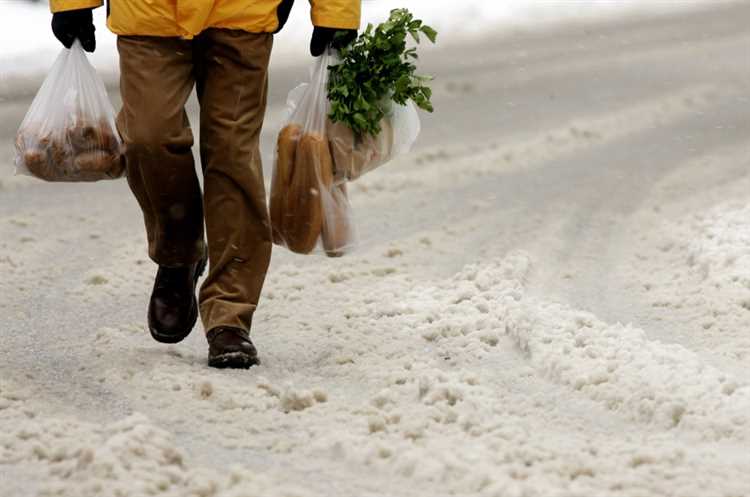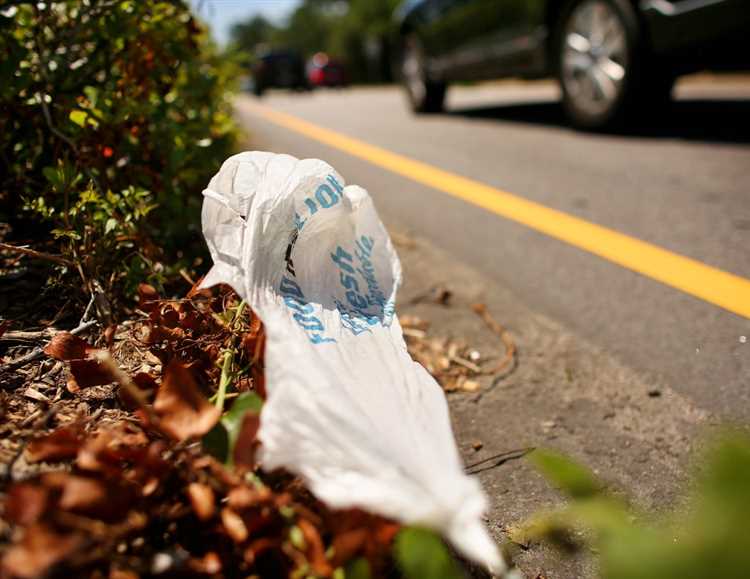In recent years, plastic pollution has become an escalating environmental issue globally. One significant contributor to this problem is the excessive production and usage of plastic bags. These lightweight and convenient carriers are widely used by consumers for various purposes, such as grocery shopping or carrying personal belongings. However, their convenience comes at a high environmental cost.
Chicago, as one of the largest cities in the United States, has not been immune to the plastic bag problem. The city’s streets, parks, and waterways have been plagued by discarded plastic bags, causing harm to wildlife, clogging drains, and contributing to an overall unsightly urban environment. Recognizing the severity of this issue, the city government has implemented various strategies to address it, including the introduction of taxes on plastic bags.
The imposition of taxes on plastic bags in Chicago has had a significant impact in the efforts to mitigate the plastic bag problem. By levying a tax on each bag used, the city aims to reduce the consumption and disposal of plastic bags and encourage the use of more sustainable alternatives. This measure not only generates revenue for the city but also serves as a deterrent for consumers, making them rethink their choices and adopt eco-friendly practices.
Furthermore, the revenue generated from the plastic bag tax is allocated towards environmental initiatives, such as promoting recycling programs and supporting the development of more sustainable packaging materials. This dual approach of discouraging plastic bag usage while investing in eco-friendly alternatives has contributed to a gradual decline in the number of plastic bags used in Chicago, leading to a cleaner and healthier environment for its residents.
- The Plastic Bag Problem in Chicago
- The Role of Taxes
- The Impact of Taxes
- Changing Consumer Habits
- Funding Environmental Initiatives
- Reducing Single-Use Plastic
- 1. Plastic Bag Bans
- 2. Disposable Plastic Straws
- Environmental Consequences
- Decreased Pollution
- Positive Impact on Wildlife
- Question-answer:
- What is the plastic bag problem in Chicago?
- Why are plastic bags a problem in the first place?
- What steps has Chicago taken to address the plastic bag problem?
- Has the tax on plastic bags been effective in reducing their usage?
- What are the potential benefits of reducing plastic bag usage in Chicago?
The Plastic Bag Problem in Chicago
Plastic bags have become a significant environmental issue in Chicago. As the third most populous city in the United States, Chicago generates a massive amount of plastic waste from single-use bags. These bags are used for a few minutes before being discarded and often end up in landfills or as litter in streets, parks, and waterways.
The potential impact of plastic bags on the environment is substantial. They are non-biodegradable and take hundreds of years to decompose. During this time, they break down into smaller microplastics that can contaminate soil and water, posing a threat to wildlife and ecosystems. Additionally, plastic bags can clog drainage systems, contributing to urban flooding and water pollution.
Recognizing the urgency of this issue, the city of Chicago has implemented various measures to address the plastic bag problem. In 2017, a citywide ban on plastic bags was introduced, which required businesses to switch to alternative packaging materials or charge customers for each plastic bag used.
Despite these efforts, the plastic bag problem persists in Chicago. Many residents continue to use plastic bags, either because they are unaware of the environmental consequences or because of convenience. The city’s infrastructure for recycling plastic bags also remains limited, further exacerbating the issue.
The Role of Taxes
To combat the plastic bag problem effectively, the city of Chicago should consider implementing taxes on plastic bags. Several cities and states have successfully reduced plastic bag usage through such measures. By levying taxes on plastic bags, the city can create a financial disincentive for their use and encourage residents to adopt more sustainable alternatives.
The revenue generated from these taxes can be allocated towards initiatives aimed at addressing plastic pollution and promoting environmentally friendly practices. This can include investment in recycling infrastructure, educational campaigns, and the development of reusable bag programs.
It is crucial for the city of Chicago to prioritize the reduction of plastic bag usage to protect its environment, wildlife, and public health. By implementing taxes on plastic bags, the city can take a significant step towards mitigating the plastic bag problem and creating a cleaner and more sustainable future for its residents.
The Impact of Taxes
Taxation is a powerful tool that governments can use to influence behavior and address social and environmental issues. In the case of the plastic bag problem in Chicago, the introduction of taxes has had a significant impact on reducing plastic bag usage and promoting the adoption of more sustainable alternatives.
First and foremost, taxes on plastic bags have directly increased the cost of using disposable bags. This additional expense discourages consumers from relying on plastic bags and encourages them to seek alternatives such as reusable bags or opting for no bag at all. By making plastic bags more expensive, taxes effectively shift consumer behavior towards more environmentally friendly options.
Changing Consumer Habits
The introduction of taxes has also played a crucial role in changing consumer habits and attitudes towards plastic bags. The higher cost incentivizes consumers to be more mindful of their bag usage and encourages them to plan their shopping trips in advance. This shift in behavior not only reduces plastic bag consumption but also fosters a greater awareness of the environmental impact of disposable bags.
Moreover, the taxes on plastic bags have generated public discourse and debate on the issue of single-use plastics. This increased awareness has led to a broader understanding of the detrimental effects of plastic bags on the environment and the need for sustainable alternatives. The tax serves as a reminder of the need for change and motivates individuals, businesses, and organizations to find innovative solutions to reduce plastic bag waste.
Funding Environmental Initiatives
Importantly, the revenue generated from these taxes can be used to fund environmental initiatives and sustainability programs. This ensures that the revenue from the tax is reinvested back into the community and used to address the plastic bag problem at its root. By funding education campaigns, recycling infrastructure, and the development of eco-friendly alternatives, the taxes create a positive cycle of change and make a lasting impact on reducing plastic bag usage.
In conclusion, taxes have had a significant impact on addressing the plastic bag problem in Chicago. They have not only discouraged the use of disposable bags but also changed consumer habits, raised public awareness, and provided funding for environmental initiatives. By implementing taxes, Chicago has taken a proactive approach to tackle the plastic bag problem and pave the way for a more sustainable future.
Reducing Single-Use Plastic
Single-use plastic is a significant environmental concern. These plastic products, such as plastic bags and straws, are used once and then discarded. They end up in landfills or, worse, in our oceans where they threaten marine life and contribute to pollution. To combat this problem, various measures have been implemented to reduce the usage of single-use plastic.
1. Plastic Bag Bans
One effective measure to reduce single-use plastic is implementing plastic bag bans. Many cities and countries have already banned or introduced fees for plastic bags, encouraging consumers to use reusable alternatives like cloth bags or paper bags. These bans have successfully reduced plastic bag consumption and waste, leading to a positive impact on the environment.
2. Disposable Plastic Straws

Another area where single-use plastic is commonly used is disposable plastic straws. To address this issue, some establishments have started offering alternatives such as paper straws or reusable metal straws. Additionally, some places have made the switch to only providing straws upon request, reducing unnecessary waste.
By implementing measures like plastic bag bans and reducing plastic straw usage, we can significantly reduce single-use plastic consumption and help protect the environment. Education and awareness programs can also play a crucial role in encouraging individuals to adopt reusable alternatives and make sustainable choices. It is essential for individuals, businesses, and governments to work together to find innovative solutions to reduce single-use plastic and mitigate its impact on our planet.
Environmental Consequences
The implementation of taxes on plastic bags in Chicago has had significant environmental consequences, leading to a reduction in plastic waste and an improvement in overall environmental sustainability. These taxes have successfully encouraged consumers to switch to reusable bags and prompted retailers to offer alternative packaging options.
One of the major environmental consequences of the tax is the reduction in the consumption of single-use plastic bags. By imposing a financial cost on these bags, consumers are incentivized to opt for reusable alternatives, such as cloth bags or sturdy plastic bags that can be used multiple times. This has led to a decrease in the number of plastic bags ending up in landfills or polluting waterways, resulting in a cleaner and healthier environment.
Decreased Pollution

The decline in single-use plastic bags has had a direct impact on reducing pollution. These bags are notorious for their non-biodegradable nature and ability to clog drains and harm wildlife. By discouraging their use through taxes, the amount of plastic waste in areas like rivers, lakes, and oceans has significantly decreased.
The decreased pollution also extends to landfills, where plastic bag litter can create unsightly and hazardous conditions. Plastic bags take hundreds of years to decompose, and many end up in landfills where they contribute to the build-up of non-biodegradable waste. With the introduction of the tax, there has been a noticeable reduction in the amount of plastic bag waste in landfills, easing the strain on these already overflowing areas.
Positive Impact on Wildlife

The decline in plastic bag usage has also had a positive impact on wildlife. Animals, especially marine creatures, are prone to mistaking plastic bags for food, leading to ingestion and potential suffocation. By reducing the availability of plastic bags in the environment, the risk to wildlife has decreased, protecting their habitats and overall ecological balance.
| Environmental Consequences of Plastic Bag Taxes |
|---|
| Reduction in single-use plastic bag consumption |
| Decreased pollution in waterways and landfills |
| Positive impact on wildlife habitats |
Question-answer:
What is the plastic bag problem in Chicago?
The plastic bag problem in Chicago refers to the excessive use of single-use plastic bags, which end up polluting the environment. These bags are often not properly disposed of and can harm wildlife, clog drains, and contribute to littering.
Why are plastic bags a problem in the first place?
Plastic bags are a problem because they are not biodegradable and take hundreds of years to break down. This means that once they are discarded, they can remain in the environment for a very long time, causing harm to wildlife and ecosystems.
What steps has Chicago taken to address the plastic bag problem?
Chicago has implemented a tax on plastic bags in an effort to reduce their usage. The tax, which is currently $0.07 per bag, aims to discourage people from using single-use plastic bags and encourage them to switch to reusable alternatives.
Has the tax on plastic bags been effective in reducing their usage?
Yes, the tax on plastic bags has been effective in reducing their usage in Chicago. Studies have shown that since the implementation of the tax, there has been a significant decrease in the number of plastic bags being used, and many people have switched to using reusable bags instead.
What are the potential benefits of reducing plastic bag usage in Chicago?
Reducing plastic bag usage in Chicago can have several benefits. It can help to reduce pollution and littering, protect wildlife and ecosystems, and conserve resources. Additionally, it can also save money in terms of waste disposal and clean-up costs.